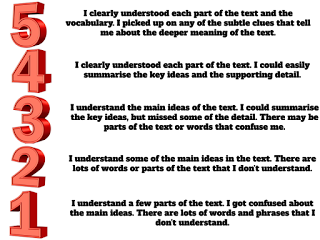My inquiry focussed on supporting students to monitor their own understanding of a text. Ultimately, I wanted my students to recognise when they did not fully comprehend something and employ a strategy/strategies to increase their level of understanding. This came from analysis of their test results, in class observation, conversations with students and the recognition that I was not teaching them to self-reflect.
In June I conducted a mini inquiry into my own teaching practice. I gathered student voice, watched videos of my teaching, gathered feedback and analysed my learning design. Overall I realised that I frequently got students to self-reflect and discuss their level of understanding in maths, but rarely did this in reading! I also found that although I explicitly taught the use of comprehension strategies, I did not discuss when to employ them, or ask the students questions about their use of strategies.
Changes to the way I teach reading
I decided to include a time for self reflection in every reading lesson. I would either get the whole class, or the group I was working with, to read a chunk of (previously unseen) text and then discuss how well they understood it. This turned into us giving ourselves a rating out of five using the scale below:
We agreed that a rating of 1,2 or 3 could impact our ability to enjoy or understand the text clearly. We would need to re-read or employ comprehension strategies to support our understanding before continuing.
This discussion was relatively simple to slot into my practice and it made a difference to student learning pretty quickly. After a week or so simply focussed on self-reflection, I began to move on to discussing strategies that we could use to support understanding. Then I was able to teach reading lessons that focussed on different strategies, but linked them back to the conversation about monitoring our understanding.
I can see from the videos of my teaching on Class onAir, that I have continued this discourse and encouraged my students to self reflect throughout my reading lessons.
Changes to my learning design
I'm disappointed in the changes that I have made to my learning design in response to this intervention. My learning design changed a lot throughout the lockdowns and in response to my students needs at level 3, so perhaps this was why I found it challenging to consistently include opportunities for my students to self-reflect. In some of my learning tasks, I might include a question such as "how well did you understand this text" and "how do you know". However, the majority of the tasks did not mention this act of self-regulation, instead focussing on the comprehension strategy or learning intention of the lesson.
This is something that I need to work on more in the future - I will definitely be considering what the layout and content of my learning activities should be during the holidays.
What the students noticed
In term four 100 percent of my class expressed that I ask them to reflect on their understanding at least once a lesson - this is not surprising as we did it so much it became very normal to discuss our understanding or rate ourselves out of 5. However, it would have been more interesting to inquire into what we did with that knowledge. Upon reflection I think we could have done far more about increasing our level of understanding if we had more time - due to covid the intervention only ran for 8 weeks.
Did the change in teaching affect student learning?
Yes, all of the students became better at monitoring their understanding - they were all able to recognise when they did not understand something. However, only the students who participated in the full eight weeks really demonstrated the ability to employ strategies to increase that understanding. There was the student who wrote this:
Im actually proud of myself with this task because, I don't take much time to read the story properly and I don't take time to understand what the story is telling me. Today was different as I took my time and processed what the story is about. I was able to understand what it was telling me and I very much enjoyed learning about something new!
And then there were the students who began to recognise that they didn't understand, but perhaps only picked up on a couple of strategies to use, which only work in certain contexts.
There were so many limitations of this intervention due to the lack of time and impact of Covid, it is hard to say whether the change in teaching increased student achievement outcomes.
To what extent did my teaching change?
The structure of my reading lessons and my classroom discourse certainly changed. It became the norm to identify a sentence, word or chunk of text that was confusing. I got used to regularly asking my students to self-reflect on their understanding of a text or concept and their answers improved over time.
But this was not the extent of change I had hoped for. I wanted to do a lot more with reciprocal reading, with teaching specific strategies as well as self-reflection. I also imagined that my activities would change, which they did, but more in response to Covid than to my intervention.
Next year I intend to continue with this intervention to allow it to gain more traction. I think with more time I will be able to see far greater changes to both my teaching practice and my students learning outcomes.


Comments
Post a Comment